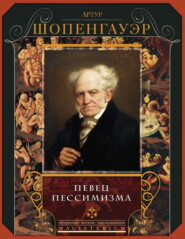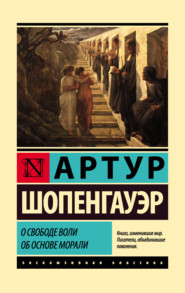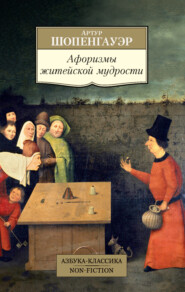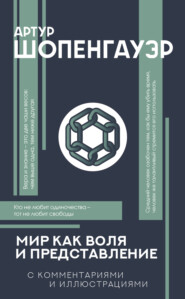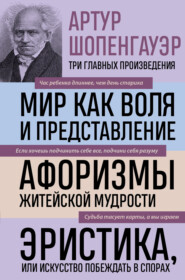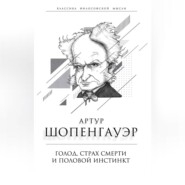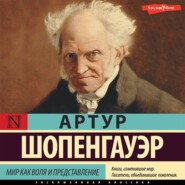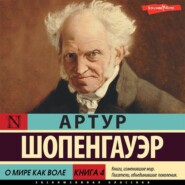По всем вопросам обращайтесь на: info@litportal.ru
(©) 2003-2024.
✖
The World as Will and Idea (Vol. 3 of 3)
Настройки чтения
Размер шрифта
Высота строк
Поля
In this, the concluding chapter, Schopenhauer sums up his results. Necessity has no meaning other than that of the irresistible sequence of the effect where the cause is given. All necessity is thus conditioned, and absolute or unconditioned necessity is a contradiction in terms. And there is a fourfold necessity corresponding to the four forms of the principle of sufficient reason: – (1.) The logical form, according to the principle of the ground of knowledge; on account of which, if the premisses are given, the conclusion follows. (2.) The physical form, according to the law of causality; on account of which, if the cause is given, the effect must follow. (3.) The mathematical form, according to the law of being; on account of which every relation expressed by a true geometrical proposition is what it is affirmed to be, and every correct calculation is irrefutable. (4.) The moral form, on account of which every human being and every brute must, when the motive appears, perform the only act which accords with the inborn and unalterable character. A consequence of this is, that every department of science has one or other of the forms of the principle of sufficient reason as its basis. In conclusion, Schopenhauer points out that just because the principle of sufficient reason belongs to the a priori element in intelligence, it cannot be applied to the entirety of things, to the universe as inclusive of intelligence. Such a universe is mere phenomenon, and what is only true because it belongs to the form of intelligence can have no application to intelligence itself. Thus it is that it cannot be said that the universe and all things in it exist because of something else. In other words, the cosmological proof of the existence of God is inadmissible.
notes
1
This chapter is connected with the last half of § 27 of the first volume.
2
De Augm. Scient., L. vi. c. 3.
3
This chapter is connected with § 23 of the first volume.
4
This chapter and the following one are connected with § 28 of the first volume.
5
Let me here remark in passing that, judging from the German literature since Kant, one would necessarily believe that Hume's whole wisdom had consisted in his obviously false scepticism with regard to the law of causality, for this alone is everywhere referred to. In order to know Hume one must read his “Natural History of Religion” and his “Dialogues on Natural Religion.” There one sees him in his greatness, and these, together with Essay 21 “Of National Characters,” are the writings on account of which – I know of nothing that says more for his fame – even to the present day, he is everywhere hated by the English clergy.
6
This chapter is connected with § 29 of the first volume.
7
In the Siècle, 10th April 1859, there appears, very beautifully written, the story of a squirrel that was magically drawn by a serpent into its very jaws: “Un voyageur qui vient de parcourir plusieurs provinces de l'ile de Java cite un exemple remarqueable du pouvoir facinateur des serpens. Le voyageur dont il est question commençait à gravir Junjind, un des monts appelés par les Hollandais Pepergebergte. Après avoir pénétré dans une épaisse forêt, il aperçut sur les branches d'un kijatile un écureuil de Java à tête blanche, folâtrant avec la grâce et l'agilité qui distinguent cette charmante espèce de rongeurs. Un nid sphérique, formé de brins flexible et de mousse, placé dans les parties les plus élevées de l'arbre, a l'enfourchure de deux branches, et une cavité dans le tronc, semblaient les points de mire de ses jeux. A peine s'en était-il éloigné qu'il y revenait avec une ardeur extrême. On était dans le mois de Juillet, et probablement l'écureuil avait en haut ses petits, et dans le bas le magasin à fruits. Bientôt il fut comme saisi d'effroi, ces mouvemens devinrent désordonnés, on eut dit qu'il cherchait toujours à mettre un obstacle entre lui et certaines parties de l'arbre: puis il se tapit et resta immobile entre deux branches. Le voyageur eut le sentiment d'un danger pour l'innocente bête, mais il ne pouvait deviner lequel. Il approcha, et un examen attentif lui fit découvrir dans un creux du tronc une couleuvre lieu, dardant ses yeux fixes dans la direction de l'écureuil. Notre voyageur trembla pour le pauvre écureuil. La couleuvre était si attentive à sa proie qu'elle ne semblait nullement remarquer la présence d'un homme. Notre voyageur, qui était armé, aurait donc prevenir en aide à l'infortuné rongeur en tuant le serpent. Mais la science l'emporta sur la pitié, et il voulut voir quelle issue aurait le drame. Le dénoûment fut tragique. L'écureuil ne tarda point à pousser un cri plaintif qui, pour tous ceux qui le connaissent, dénote le voisinage d'un serpent. Il avança un peu, essaya de reculer, revint encore en avant, tâche de retourner en arrière. Mais s'approcha toujours plus du reptile. La couleuvre, roulée en spirale, la tête au dessus des anneaux, et immobile comme un morceau de bois, ne le quittait pas du regard. L'écureuil, de branche en branche, et descendant toujours plus bas, arriva jusqu'à la partie nue du tronc. Alors le pauvre animal ne tenta même plus de fuir le danger. Attiré par une puissance invincible, et comme poussé par le vertige, il se précipita dans la gueule du serpent, qui s'ouvrit tout à coup démesurément pour le recevoir. Autant la couleuvre avait été inerte jusque là autant elle devint active dès qu'elle fut en possession de sa proie. Déroulant ses anneaux et prenant sa course de bas en haut avec une agilité inconcevable, sa reptation la porta en un clin d'œil au sommet de l'arbre, où elle alla sans doute digérer et dormir.”
In this example we see what spirit animates nature, for it reveals itself in it, and how very true is the saying of Aristotle quoted above (p. 106). This story is not only important with regard to fascination, but also as an argument for pessimism. That an animal is surprised and attacked by another is bad; still we can console ourselves for that; but that such a poor innocent squirrel sitting beside its nest with its young is compelled, step by step, reluctantly, battling with itself and lamenting, to approach the wide, open jaws of the serpent and consciously throw itself into them is revolting and atrocious. What monstrous kind of nature is this to which we belong!
8
“Augustini de civit. Dei,” L. xi. c. 27, deserves to be compared as an interesting commentary on what is said here.
9
This chapter is connected with §§ 30-32 of the first volume.
10
This chapter is connected with §§ 33-34 of the first volume.
11
This chapter is connected with § 36 of the first volume.
12
There is nothing else in the world but the vulgar.
13
In Medwin's “Conversations of Lord Byron,” p. 333.
14
This chapter is connected with the second half of § 36 of the first volume.
15
Rgya Tcher Rol Pa, Hist. de Bouddha Chakya Mouni, trad. du Tibétain, p. Foucaux, 1848, p. 91 et 99.
16
In German inferiors are sometimes addressed as Er instead of Sie. —Trs.
17
This chapter is connected with § 38 of the first volume.
18
This chapter is connected with § 49 of the first volume.
19
This chapter is connected with § 43 of the first volume.
20
This chapter is connected with §§ 44-50 of the first volume.
21
This chapter is connected with § 51 of the first volume.
22
Lichtenberg (“Vermischte Schriften,” new edition, Göttingen, 1884, vol. iii. p. 19) quotes Stanislaus Leszczynski as having said, “La modestie devroit être la vertu de ceux, a qui les autres manquent.”
23
This chapter is connected with § 51 of the first volume.
24






